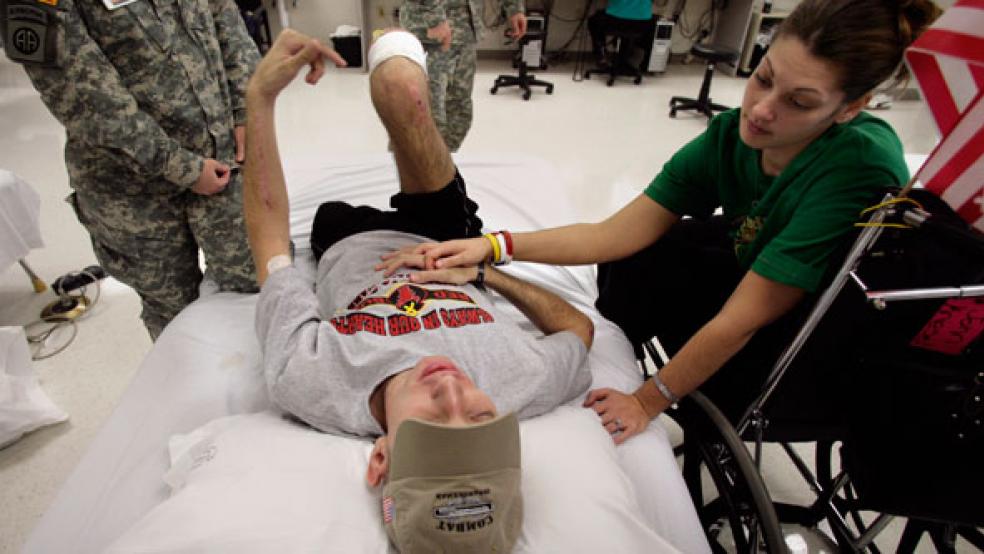In a recent speech outlining how the Defense Department plans to reduce spending in the coming years, Secretary of Defense Chuck Hagel took aim at the sacred cow of the military: compensation for soldiers.
In policy circles in Washington, reforming compensation has been the elephant in the room since sequestration and defense spending cuts began. Hagel’s speech made it official.
“Without serious attempts to achieve significant savings in [compensation] – which consumes roughly half of the DOD budget and is increasing every year – we risk becoming an unbalanced force," Hagel said last week. "One that is well-compensated, but poorly trained and equipped, with limited readiness and capability."
Changes to soldiers’ compensation, which includes pay, health insurance and veterans’ benefits, was once politically toxic on Capitol Hill. But lawmakers have indicated in recent weeks that they’re open to reducing benefits to cut costs.
Related: Hagel Picks a Fight with the Pentagon, Congress
Military advocates have made their objections to rising health insurance premiums and cuts in pay well known. But cuts to other programs for veterans are rarely mentioned. Veterans advocacy groups are now warning that key programs that help members of the armed forces transition to life in the private sector, as well as keep them healthy, are at risk.
David Hobson, executive director of the National Organization of Veterans' Advocates, said that cuts to defense programs makes it difficult for soldiers to get treatment for injuries suffered as members of the military. He said he expects these problems to be exacerbated as soldiers retire after more than a decade of war.
“A lot of veterans haven’t come back and made those claims,” he said. “We expect many more to come once they leave service.”
Backlog of Claims
Hobson, whose group advocates for soldiers attempting to acquire VA benefits, said that funding cuts have made the backlog of claims much worse. “The VA has made an extraordinary effort to remove the backlog, but in the course of doing that, what they have done is that they have moved people who processed the appeals,” he said, referring to staffing changes due to Defense Department cutbacks. “The cases that are the most difficult, those things are backing up.”
This backlog prevents soldiers from getting care for the long-term effects of injuries as simple as a broken leg. They also stop soldiers suffering from post-traumatic stress disorder from getting the proper treatment. PTSD cases have skyrocketed in the wake of Iraq and Afghanistan, and the disease has been directly linked to the military’s suicide problem.
Hobson added that the problem is especially acute because the Pentagon lost or inadvertently destroyed troves of records related to service and injuries in Iraq and Afghanistan. Without these records, former soldiers cannot prove that they were injured. Some can’t even prove that they were in theater, Hobson said.
“You have to prove there was a connection to your days in the service. If these records are lost, what proof do you have? A lot of vets, once they get discharged, don’t keep their records,” he said.
Other Programs Cut
It’s not just VA staffing that’s suffered under sequestration. Dozens of other veterans’ programs have been cut.
For instance, Veterans Employment and Training program, which helps veterans find jobs in the private sector, has lost $4 million since sequestration began. It's expected to lose more as it continues. Grants to states meant to aid in this transition have also been cut. Suicide prevention programs are being squeezed, according to the American Legion.
Related: The 3 Biggest Losers from a Slashed Defense Budget
Education benefits are also expected to suffer in the coming years. According to Student Veterans of America, a group that advocates for veterans’ education, the Marine Corps tuition assistance program has already been subject to two cuts due to sequestration. From 2009 to 2013, DOD slashed $19 million from the program. More cuts are expected in the coming years.
"I understand there are pressures given the current budgetary situation; however, with the number of Marines expected to leave active service in the coming years, and the increased demand for educated workers in the civilian job market, I find the decision to restrict this program detrimental to the long term vitality of our country,” Student Veterans of America’s executive director D. Wayne Robinson said in a statement last week.
Top Reads from The Fiscal Times:





